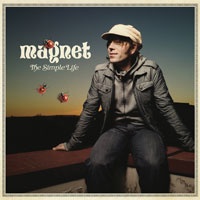
Who is Black Francis? And where has he been all these years?
The first question seems fatuous, the second coy. Even the 21 year old hipster who was still eating strained peas and filling diapers in 1987 when the Pixies released Come On Pilgrim knows that Black Francis was the frontman, resident UFOlogist, and tortured lead screamer for this most pivotal underground band that almost made it mainstream—opened for U2 during the Achtung Baby tour, for Chrissakes—before he broke the band up by fax.
And Black Francis hasn’t gone anywhere, despite the fact that there have been no releases on which that nom de plume played from 1991’s Trompe Le Monde to 2004’s “Bam Thwok.” That selfsame callow hipster knows that Black Francis became Frank Black when he went solo in 1993, and released a series of solid, if workmanlike, releases between the debut s/t and 2006’s Fast Man/Raider Man.
So much for the history. The questions remain: where has Black Francis been in Frank Black’s solo work for thirteen to fifteen long years? And who is Black Francis, as opposed to Frank Black, anyway? And, most pertinently to Tuesday’s full-length release Bluefinger, why is this the first release of Frank Black’s career to be credited to Black Francis? These are all related questions with one at their core: what is the Black Francis sound?
As I ask the question, I hear Charles Michael Kittridge Thompson IV, aka Frank Black, aka Black Francis, cough, then laugh dryly, then advise me to go f*cking die.
But there is something to the change of name, for sure. Or else this would have been the fifteenth release credited to Frank Black. So is this a change of soul? Or just of brand?
MBA voice over: The Black Francis brand stands for slicing up eyeballs, screaming, quiet loud quiet, being the band that inspired Nirvana, and being the most awesome band ever. The Frank Black brand stands for a workmanlike approach to rock and roll. Direct to two track. Country rock. Low sales. As he sang in “Chip Away Boy,” “I used to have some fun/Me and everyone/Now I’m just employed.”
And that may be all there is to it. Except.
Exhibit A: “Captain Pasty.” Mars attacking. Irregular meters. And that awesome growl-laugh that opens up the track. It will make your car go like nitrous, if you happen to be behind the wheel when you are listening
Exhibit B: “Tight Black Rubber,” with its Fugazi meets Nirvana bass + guitar duet settling into a Meat Puppets meets Velvets chugging rocker full of tension and bondage tropes.
Exhibit C: “Your Mouth Into Mine.” Could be a Frank Black song, except the spaces between the verses run over with Black Francis’s love-as-body-invasion imagery at a speed that feels at once relaxed and chemically enhanced. Love never sounded so much like theft.
Exhibit D: “You Can’t Break a Heart and Have It.” The one song on the album that provides a tight connection to the album’s supposed inspiration, transgressive druggie Dutch artist/musician Herman Brood, whose song this was before Black Francis made it his own.
Exhibit E: “Threshold Apprehension.” A romp through Pixies touchstones, from high pitched, screaming vocals to four-chord hooks to girlish spoken background vocals (courtesy Charles’s wife Violet Clark) to two of the finest couplets in post-Pixies rock: “Every little sh*t gotta find his salt lick/If I don’t find my babe I’m gonna be junk sick” and “Grand Marnier and a pocketful of speed/We did it all night til we started to bleed.” The hit single the Pixies should have had in the summer of 2007, showing up first as a bonus track on the best of compilation Frank Black 93-03. Your reviewer was stuck in traffic on the Mass Pike the first time he heard the song and nearly rear ended the car in front of him, so immediately propulsive was the impact of the song, and so hard was he laughing with the force of the bliss coming at him from six speakers.
Even in slacker moments an animus of tension and anger moves the record forward. “She Took All the Money”’s “shama lama ding dang” chorus is pushed forward by an irritable rhythm guitar, surprisingly sweet backing vocals from Violet Clark, and some impatient drumming that takes the song out on just the right dry note.
So: what makes it a Black Francis work? There are some descriptive touchstones—screaming, odd meters, UFOs, Lou Reed as Surrealist lyrics—that are ultimately insufficient to describe what’s going on here. What this is is nothing more than the rebirth of Charles Thompson, his musical juices revitalized by the 2004 tour with the Pixies. As he says in the publicity notes for the album, reunions “are bittersweet, and all of the rekindled foreplay of performing the old Black Francis songs never warmed to the full coitus of a reunion LP…I privately went back to the old stage name…almost as a joke. I couldn’t get the Pixies back into the studio, but I would transform into my alter ego of yesteryear.” And even if there is no Herman Brood revival as a result of this LP—Wikipedia can’t even be bothered to link to his artwork, and none of his music is available in the usual download sources—the transgressive junkie artist/musician/suicide deserves some posthumous credit for waking up Black Francis and sending him out screaming into the light of 2007.


